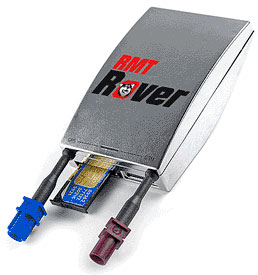While an 11-year old, Louisville, Kentucky boy is using a toy radar gun to get drivers to slow down through his neighborhood, the police are finding that real radar guns might not be a match for GPS--at least not when contested in court.
According to a press release issued by Rocky Mountain Tracking, an 18-year old man, Shaun Malone, was able to successfully contest a speeding ticket in court using the data from a GPS device installed in his car. This wasn't just any old make-a-left-turn-100-feet-ahead-onto-Maple-Street GPS; this was a vehicle tracking GPS device--the kind used by trucking fleets--or in this case, overprotective parents. The device was installed in Malone's car by his parents, and the press release makes no mention if the teenager knew that the device was installed in his vehicle at the time.
 |
| Credit: Rocky Mountain Tracking |
No matter, because Malone knew by the time he had to show up in court to contest the speeding ticket for going 17-mph over the posted 45-mph speed limit. While the police clocked him going 62-mph, the GPS's data in fact showed him driving at the 45-mph speed limit. In an initial trial-by-affidavit, Malone was found guilty of speeding. GPS expert, Dr. Stephen Heppe wrote a report that essentially said that the GPS data was not accurate enough to contest the accuracy of the radar gun. Malone appealed the decision and had his day in court. At trial, things played out differently:
"However, when he took the stand to begin his testimony, Dr. Heppe corrected that written report, saying that the Rocky Mountain Tracking device was "very" accurate, to within a couple of meters on location and to within 1 mph on speed. Dr. Heppe also pointed out that the GPS device released instantaneous data, and not data averaged over a distance."
Needless to say, with Dr. Heppe's revised testimony, Malone was found innocent of speeding.
Obviously, Rocky Mountain Tracking's motivation for publicizing this incident is to promote the accuracy of its RMT Rover GPS device. But it also brings up a larger issue: The sophistication of vehicle telematics is increasing all the time. Are we now at the point that the data generated from our personal location devices (such as GPS in cell phones and in-car navigation devices) is considered reliable enough to help exonerate us from false accusations? But isn't this also a slippery slope, where the same data can be used to incriminate us as well? It's one thing for parents to keep a close eye on their kids, but what happens when jealous spouses are tracked, or law enforcement uses the data to know where you've been. When does it become an invasion of privacy? Tell us what you think.

